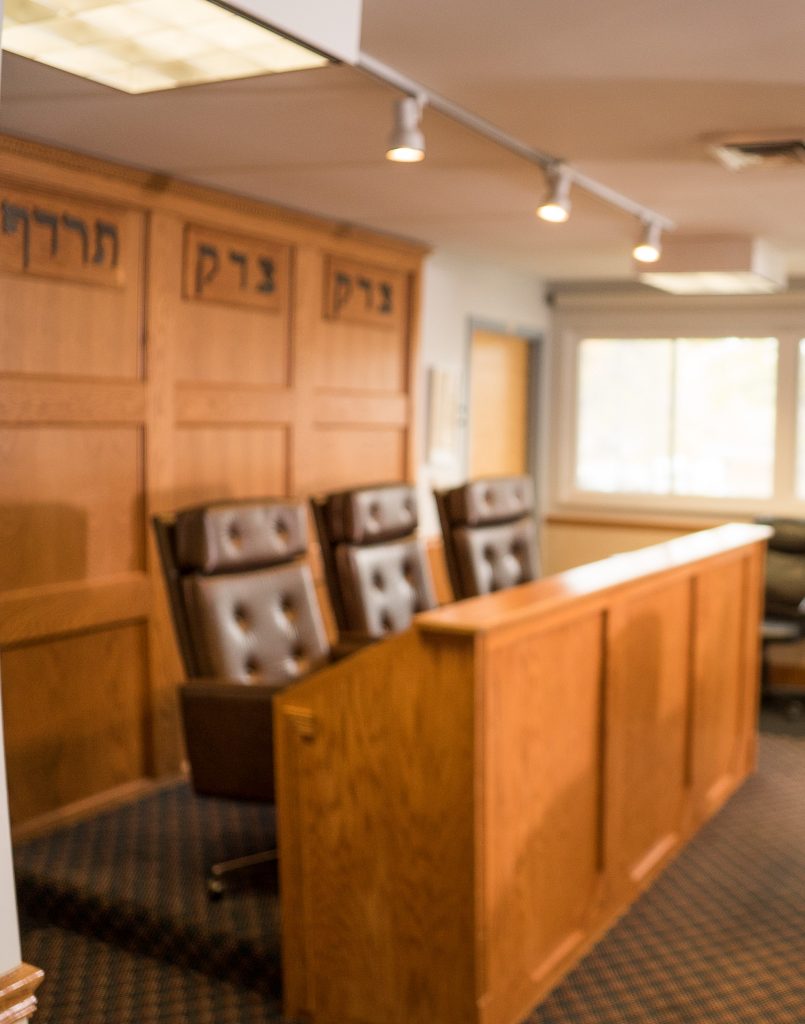Din Torah – Halachic Arbitration

The Beth Din of the Chicago Rabbinical Council is available to hear disputes (“Dinei Torah”) brought before it, when the parties involved live in the Greater Chicago area. In the situation that the defendant lives outside of Greater Chicago, the Beth Din will only convene a Din Torah if the parties voluntarily submit to its jurisdiction.
The rabbis state that the greatest blessing resides within the value of peace. This goal forms the basis for the operation of the cRc Beth Din. The Beth Din, therefore, strives for a dignified approach to resolution of difficulties within our community. The cooperation of all parties towards achieving such a goal is anticipated.
The Beth Din of the cRc works to ensure that all matters be treated with timeliness and dignity. To assist the Beth Din in this goal, it is kindly requested that phone conversations and/or correspondence involving the Din Torah be kept as brief and infrequent as is reasonable under the circumstances.
Fees For Initiating a Din Torah
The cost of initiating a Din Torah is $200.00. This fee is meant to cover administrative costs and is not applied to the time spent on hearing and deciding the Din Torah.
The actual cost of a Din Torah, to be shared equally by both parties, is $200.00 per hour. The parties may both agree to a Din Torah presided over solely by the Av Beth Din (head of the Rabbinic Court), Rabbi Yona Reiss, Shlit”a, or a Din Torah with a full Beth Din of Dayanim (Rabbinic judges).
The Process
- A Din Torah begins with the filing of a letter by the plaintiff, outlining the charges to be heard. This letter should be specific with regards to the claim and must contain the addresses and phone numbers of all involved parties. A copy of this letter is then sent to all parties who are designated as defendants.
- A Hazmanah (letter of appointment) is then sent to the defendant(s), containing a copy of the charges and information on the date of the hearing. Should the defendant(s) not appear at a Din Torah, the Beth Din may determine what further action may be taken against them. On occasion, the Beth Din may grant the plaintiff permission to sue in civil court or may impose certain sanctions against the defendant(s).
- Where both parties do appear at a Din Torah, they are asked to sign a form that indicates their willingness to be bound by the decision rendered by the Beth Din. Secular courts have held that this agreement may be enforced as a binding arbitration agreement.
- Parties at a Din Torah may come accompanied by legal counsel and witnesses, and the proceedings are recorded. The rabbis at a Din Torah will grant a reasonable time period for each side to present its case.
A decision is often rendered on a Din Torah within 20 days. After the Din Torah (as well as the time prior to it), the parties may have no communication with any of the rabbis involved in the Din Torah. All communications and questions must be addressed to the Administrator (“Menahel”) of the Beth Din.
Protocol and Decorum
A Din Torah is a formal proceeding. The parties must speak in turn and must address all comments to the rabbis.
Improper conduct at a hearing is an affront to the dignity required by a proceeding defined by Torah principles.
Informal dress is discouraged. Immodest clothing, such as tattered clothing, short-sleeved garments, or low-cut dresses, is unacceptable.
All questions about Beth Din procedures should be addressed to the Beth Din Administrator (773-465-3900). Should the Beth Din refuse, or be unable to hear a Din Torah, it will make suggestions for a proper forum for resolution of the dispute.
Mediation
 It is highly desirable that all matters be resolved before a Din Torah is convened. Therefore, the Beth Din will also offer its offices to consider mediation of disputes.
It is highly desirable that all matters be resolved before a Din Torah is convened. Therefore, the Beth Din will also offer its offices to consider mediation of disputes.
Should a dispute be resolved before a formal hearing is convened, the Beth Din will refund fees collected from either (or both) of the parties.
Our staff is also available for informal proceedings if preferred.


